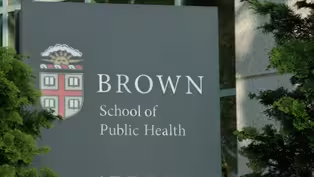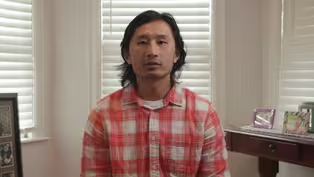
Virtual Care
Clip: Season 6 Episode 19 | 8m 59sVideo has Closed Captions
Telepsychology offers new hope for local students amidst a growing mental health crisis.
The mushrooming mental health crisis among Rhode Island children, some as young as 5, coupled with a shortage of clinical social workers and counselors is generating a new tool in local schools: Virtual Care. This year, telepsychology is being offered in a number of districts. But will low cost, high-tech help for social and emotional issues lead to happier, more well-balanced children?
Problems playing video? | Closed Captioning Feedback
Problems playing video? | Closed Captioning Feedback
Rhode Island PBS Weekly is a local public television program presented by Ocean State Media

Virtual Care
Clip: Season 6 Episode 19 | 8m 59sVideo has Closed Captions
The mushrooming mental health crisis among Rhode Island children, some as young as 5, coupled with a shortage of clinical social workers and counselors is generating a new tool in local schools: Virtual Care. This year, telepsychology is being offered in a number of districts. But will low cost, high-tech help for social and emotional issues lead to happier, more well-balanced children?
Problems playing video? | Closed Captioning Feedback
How to Watch Rhode Island PBS Weekly
Rhode Island PBS Weekly is available to stream on pbs.org and the free PBS App, available on iPhone, Apple TV, Android TV, Android smartphones, Amazon Fire TV, Amazon Fire Tablet, Roku, Samsung Smart TV, and Vizio.
Providing Support for PBS.org
Learn Moreabout PBS online sponsorship(light calming music) 10-year-old Kaidin Sanchez is musical, artistic and a good student, but like so many children, the fourth grader wasn't happy about school days.
- I just felt sad in my brain and it's been like kind of hard and I've been like stressed in the past.
- Should we separate them?
- Yeah, we should.
- [Pamela] And so is his mother, Sairis Reyes.
- I was so stressed out, I didn't know what to do.
He was having a really tough time getting to school.
In the morning, like he would cry every morning.
It would take me like a half hour just to get him inside of the building.
- Okay, just one more.
- [Pamela] Reyes says her son would complain of a stomach ache just to stay home.
- I would be late to work all the time.
- Hmm, which way?
- [Pamela] Yet deep inside, Kaidin Sanchez says he knew the reason.
- Why?
- Because there is like the different kids who didn't know personal space or like they didn't know boundaries of mine and I was like kind of mad.
(kids chattering) - [Pamela] A recent study by the Rhode Island child advocacy agency, KIDS COUNT finds many of the ocean state's children are suffering from depression.
36% of high school students and 30% of those in middle school registered degrees of sadness and hopelessness.
(footsteps pattering) Ana Riley, Superintendent of the Bristol Warren School District says classrooms across the state are challenged by students wrestling with a range of social and emotional issues.
- For some students it could be just some mild school anxiety and they just need some supports or some extra encouragement to, you know, be at school and complete their work.
Some behavioral outbursts, I would say more bullying, more self-image issues, more self-esteem issues just based on the images they're seeing and what they're surrounded by on social media.
- [Pamela] Riley says schools are familiar with those mental health issues, but there's a more recent factor at play, the pandemic.
- Today, our current kindergartners were just born or young toddlers when Covid started.
And so that wonderful interaction with family and strangers and just seeing facial expressions, they missed all of that, you know, they really had too many months without being able to interact with other people and show and react to emotion.
And so they bring that to school with them.
(kids chattering) - [Pamela] This growing need for mental health treatment coupled with a shortage of counselors both in schools and private practice, prompted the Bristol Warren School District to pilot a new supplemental program in March of 2024.
It's virtual therapy called Cartwheel.
- They are available eight to eight, seven days a week and it is a licensed mental health therapist who will do one-to-one therapy with students or with families.
It can be anywhere from six to 10 weeks depending on the need.
And if they feel like the patient would benefit from an extended service, most cases can go as long as six months.
- [Pamela] A student is referred to Cartwheel by a school social worker.
Services are available in six languages, including Spanish and Portuguese, and parents are offered online advice and strategies to assist their child.
Riley also gives Cartwheel telepsychology an A for rapid appointment scheduling.
- It only takes 24 to 48 hours for Cartwheel to reach out to families, and then they have an appointment within seven to 10 days.
- These are all where of the white studs go.
- [Pamela] Easy access is an important feature for worried parents like Reyes who found therapists in her community were booked solid.
- They had a waiting list or some of them was a nine month waiting period.
I didn't wanna wait because it was starting to get worse.
- [Pamela] Kaidin attends Achievement First Charter School in Providence, which uses Cartwheel as does the Warwick School system.
Reyes says Kaidin has just completed his virtual sessions and she's seen a big change because of the online counselor.
- She helped me with coping skills and she would always like tell me like to breathe in and breathe out if I ever get angry or like trace a shape while breathing in and breathing out.
- Were you really able to connect with her?
Did you feel comfortable doing it online?
- I think it was comfortable because I got to like talk about all my feelings I had through the day.
- [Pamela] In December, the Rhode Island Department of Education announced a similar virtual program to expand clinical care in local schools.
Hazel Health is being rolled out in various phases based on individual community needs.
As for how successful Telepsychology can be opposed to in-person therapy?
- I think it's been widely effective for students who wouldn't have been able to even get into a counseling session at this point.
For me, the idea that they got immediate assistance outweighs the risk of saying in-person is better than telehealth.
- Joe Trunzo is Associate Director of the School of Behavioral Health and Sciences at Bryant University and President of the Rhode Island Psychological Association.
He says the organization supports the use of virtual counseling in general.
Is it as effective for children and adolescents?
- I think the older the client is, I think the easier and the more effective it can be.
Where it gets particularly tricky is when you're doing any kind of formal assessment, neuropsychological evaluations, comprehensive behavioral evaluations, those can be a lot more difficult to do over telehealth.
I think the preference is always to be in person when it's possible.
- [Pamela] Trunzo also says there's help on the horizon to provide Rhode Island with more clinicians.
Bryant is preparing to offer a doctorate program in clinical psychology starting in the fall semester.
- Within a few years we'll be getting some bonafide licensed clinicians out into the community to help to address this problem.
- [Pamela] But while that's still often the future, for now, virtual mental health therapy seems to be gaining traction.
Superintendent Riley says in Bristol Warren results are still preliminary, however... - What we see is anecdotally in classrooms and in the data that kids are coming to school, attendance has improved.
We've seen those students performing better in class, being engaged, maybe even blossoming some friend groups.
- We need four.
I'll do the black one.
- [Pamela] And for this mother and son, telehealth was transformative.
- The results are amazing.
We go to school on time every day.
- What's different about school these days?
- I'm not like sad in my brain, I'm just hugging my mom saying goodbye and going in school.
- And how is it when you're in school now?
How is it different?
- I'm getting calmer and calmer and more calmer.
- And that makes me happy.
If he's happy, I'm happy, yeah.
(Pamela laughing)
Video has Closed Captions
Clip: S6 Ep19 | 11m 1s | The Trump administration pulling millions of dollars in research funding from Rhode Island. (11m 1s)
Video has Closed Captions
Clip: S6 Ep19 | 5m 38s | Isabella Jibilian’s story on a local Hmong family who talk about their history in Rhode Island. (5m 38s)
Providing Support for PBS.org
Learn Moreabout PBS online sponsorship
- News and Public Affairs

Top journalists deliver compelling original analysis of the hour's headlines.

- News and Public Affairs

FRONTLINE is investigative journalism that questions, explains and changes our world.












Support for PBS provided by:
Rhode Island PBS Weekly is a local public television program presented by Ocean State Media

